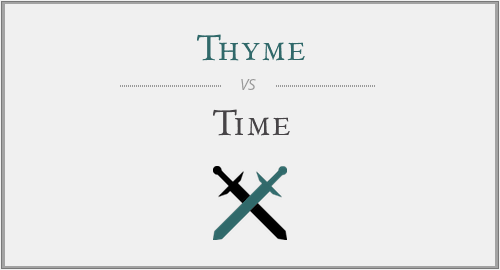
Thyme vs. Time
In truth, there is in fact a huge difference between the meanings of “thyme” and “time”. Despite their similar spellings, the two words are used in completely different contexts, have completely different meanings and are not connected in any way. In fact, even their levels of complexity are different.
More specifically, while “thyme” is a very simple word, with a meaning that’s easy to remember and a unique grammatical function, “time” is used under many different circumstances, has multiple meanings and roles and even functions differently within different phrases. Below you’ll find the exact information for each of these words in order to clarify, once and for all, these two basic words in English.
When do we use “thyme”?
With “thyme”, you know where you stand. It has one very clear definition and is therefore simple and easy to remember. There is only one function of "thyme" within any phrase, as it's only ever used only as a noun. And even better, the word has a single meaning, the same every time. “Thyme” defines an edible herb, with unique flavor, used in cooking.
Example: The herbs needed for this recipe are oregano, thyme and basil. – “thyme” is a herb used for cooking.
When do we use “time”?
“Time” is a little bit more complex than “thyme”, but not actually complicated once you understand how it’s used. Primarily, the function of “time” in phrases is noun; but it can also be used as a verb in certain contexts. So let’s look at each instance one at a time.
As a noun, “time” defines a concept that people measure in units like minutes, hours, days, years etc. From this primary meaning, there are several other secondary applications that the word carries, such as a particular point during a day or a night, an occasion or even to express how better or how much bigger or worse somebody or something is than somebody else or something else.
When used as a verb, “time” mainly refers to deciding that something is going to happen at a particular point, at a particular hour or even second. Secondly, “time” may also define the action of measuring how long it takes for somebody to do something or for something to happen.
Example 1: Ten years without the presence of parents is a long time for a child. – as a noun, “time” is a concept that people measure in minutes, hours, days, years etc.
Example 2: What time will you come to pick me up? – “time” can also be used as a noun when referring to a certain point during day or night.
Example 3: Next time you visit, make sure you check out this place! – “time” may also define a certain occasion when used as a noun.
Example 4: Her apartment was at least two times, if not three times bigger than yours. – “time” can also be used to express how much better or bigger something is than something else.
Example 5: They decided to time the presentation on Monday, at 8:45 a.m. – as a verb, “time” refers to deciding that something is going to happen at a particular point.
Example 6: Can you please time me while underwater? – lastly, “time” can also be used as a verb defining the action of measuring how long it takes for somebody to do something.
Conclusion
Even though nothing in the word “time” itself is complicated, it carries a lot of depth in its definition and is used much more commonly than “thyme”, which is simply the name of an aromatic herb. “Time”, on the other hand, is mainly the concept we are measuring in hours, days, weeks etc. (when used as a noun), and can also be used as a verb sometimes.
The best thing to keep in mind from this article – other than all the meanings explained above – are that firstly, there is no connection between “thyme” and “time” despite the close spellings of the two and, secondly that “thyme” has a unique function and meaning (noun, meaning an aromatic herb), while “time” can be used both as noun and verb, with different meanings derived from the primary one.




Have a discussion about this article with the community:
Report Comment
We're doing our best to make sure our content is useful, accurate and safe.
If by any chance you spot an inappropriate comment while navigating through our website please use this form to let us know, and we'll take care of it shortly.
Attachment
You need to be logged in to favorite.
Log In